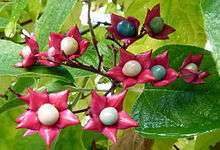Clerodendrum trichotomum
| Clerodendrum trichotomum | |
|---|---|
 | |
| Scientific classification | |
| Kingdom: | Plantae |
| (unranked): | Angiosperms |
| (unranked): | Eudicots |
| (unranked): | Asterids |
| Order: | Lamiales |
| Family: | Lamiaceae |
| Genus: | Clerodendrum |
| Species: | C. trichotomum |
| Binomial name | |
| Clerodendrum trichotomum | |
| Wikimedia Commons has media related to Clerodendrum trichotomum. |
Clerodendrum trichotomum (harlequin glorybower, glorytree, peanut butter tree) is a species of flowering plant in the genus Clerodendrum. It is placed in the family Lamiaceae, or sometimes the Verbenaceae. It is native to China, Korea, Taiwan, Japan, and India.[1]
It is a large shrub, growing 3–6 metres (10–20 ft) high. The leaves are ovate, up to 12 cm (5 in) long, soft and downy or hairy, producing a peanut odor when crushed. The fragrant flowers are borne on branching peduncles. They have white petals, held within a green calyx which turns red as the fruits ripen. The fruits (drupes) are white, changing to bright blue and eventually dark blue on maturity.[2] They contain the novel blue pigment Trichotomine.[3]
It is cultivated for its fragrant flowers, autumn colour, and ornamental berries. It is hardy but requires a sheltered position. The variety C. trichotomum var. fargesii (Farges' harlequin glorybower) has gained the Royal Horticultural Society's Award of Garden Merit.[4] (confirmed 2017).[5]
References
- ↑ "Clerodendrum trichotomum". Germplasm Resources Information Network (GRIN). Agricultural Research Service (ARS), United States Department of Agriculture (USDA). Retrieved 23 January 2018.
- ↑ RHS A-Z Encyclopedia of Garden Plants. United Kingdom: Dorling Kindersley. 2008. p. 1136. ISBN 1405332964.
- ↑ Iwadare S, Shizuri Y, Yamada K, Hirata Y. Synthesis of trichotomine, a blue pigment obtained from clerodendron trichotomum thunb. Tetrahedron. 1978; 34(10):1457-1459. doi:10.1016/0040-4020(78)80166-5
- ↑ Clerodendrum trichotomum var. fargesii. Royal Horticultural Society.
- ↑ "AGM Plants - Ornamental" (PDF). Royal Horticultural Society. July 2017. p. 22. Retrieved 24 January 2018.
Further reading
- Hillier, J. and A. J. Coombes. The Hillier Manual of Trees and Shrubs. David & Charles. 2007.